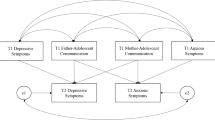Abstract
In Study 1, 605 adolescents estimated how well their parents knew them and said how much they cared what their parents thought about them. Sons and daughters judged that mothers knew them fairly well, but daughters judged that fathers did not know them so well. At the same time, statements of caring indicated high concern by sons and daughters for both parents. A supplemental result was that sons from white-collar families gave relatively low estimates of how much their mothers knew them and daughters from blue-collar families gave very low estimates of how much their fathers knew them. In Study 2, 52 adolescents from single-parent families and living with their mothers but not with their fathers also gave estimates for knowing and caring. Knowing followed the above pattern, with an expected lowering of estimates for fathers by sons and daughters. Further, estimates of caring declined especially for fathers by daughters. These results add to the growing literature that shows mother-adolescent and father-adolescent relationships contribute differentially to psychological development. The results seem especially relevant for adolescents' sex role development and constructed individuality as mediated through relationships with both parents.
Similar content being viewed by others
References
Bell, D. C., and Bell, L. G. (1983). Parental validation and support in the development of adolescent daughters. In Grotevant, H. D., and Cooper, C. R. (eds.),Adolescent Development in the Family. Jossey-Bass, San Francisco.
Berndt, T. J. (1979). Developmental changes in conformity to peers and parents.Develop. Psychol. 15: 608–616.
Burke, R. J., and Weir, T. (1979). Helping responses of parents and peers and adolescent well-being.J. Psychol. 102: 49–62.
Coleman, J. S. (1961).The Adolescent Society. Free Press, New York.
Cooper, C. R., Grotevant, H. D., and Condon, S. M. (1983). Individuality and connectedness in the family as a context for adolescent identity formation and role-taking skill. In Grotevant, H. D., and Cooper, C. R. (eds.),Adolescent Development in the Family. Jossey-Bass, San Francisco.
Dosser, D. A., Jr., Balswick, J. O., and Halverson, C. F., Jr. (1986). Male inexpressiveness and relationships.J. Soc. Personal. Relat. 3: 241–258.
Douvan, E., and Adelson, J. (1966).The Adolescent Experience. Wiley, New York.
Fasick, F. A. (1984). Parents, peers, youth culture, and autonomy in adolescence.Adolescence 19: 143–157.
Fine, M. A., Moreland, J. R., and Schwebel, A. I. (1983). Long term effects of divorce on child relationships.Develop. Psychol. 19(5): 703–713.
Freud, A. (1968). Adolescence. In Widner, A. E., and Angus, D. L. (eds.),Adolescence, American Book Company, New York.
Furstenberg, F. F., and Nord, C. W. (1985). Parenting apart: Patterns of childrearing after marital disruption.J. Marriage Family 47: 893–904.
Grotevant, H. D., and Cooper, C. R. (1986). Individuation in family relationships.Human Develop. 29: 82–100.
Hunter, F. T. (1985). Individual adolescents' perceptions of interactions with friends and parents.J. Youth Adoles. 5(3): 295–305.
Hunter, F. T., and Youniss, J. (1982). Changes in functions of three relations during adolescence.Develop. Psychol. 18: 806–811.
Jourard, S. M., and Richman, P. (1963). Factors in the self-disclosure inputs of college students.Merrill-Palmer Q. 9: 141–148
McCarthy, J. D., and Hoge, D. R. (1982). Analysis of age effects in longitudinal studies of adolescent self-esteem.Develop. Psychol. 18: 372–379.
Noller, P., and Bagi, S. (1985). Parent-adolescent communication.J. Adoles. 8: 125–144.
Rubin, L. B. (1976).Worlds of Pain. Basic Books, New York.
Smollar, J., and Youniss, J. (1982). Social development through friendship. In Rubin, K. H., and Ross, H. S. (eds.),Peer Relations and Social Skills in Childhood. Springer Verlag, New York.
Smollar, J., and Youniss, J. (1985). Parent-adolescent relations in adolescents whose parents are divorced.J. Early Adoles. 5: 129–144.
Volpe, J. (1981). The development of concepts of self: An interpersonal perspective. In Meacham, J. A. and Santilli, N. R. (eds.),Social Development in Youth: Structure and Content. Karger, Basel.
Wallenstein, J. S., and Kelly, J. B. (1980).Surviving the Breakup: How Children and Parents Cope with Divorce. Basic Books, New York.
Waterman, A. S. (1981). Individualism and interdependence.Am. Psychol. 36: 762–773.
Weiss, R. S. (1979). Growing up a little faster: The experience of growing up in a single-parent household.J. Social Issues 35(4): 97–111.
Wright, P. H., and Keple, T. W. (1981). Friends and parents of a sample of high school juniors.J. Marriage Family 43: 559–570.
Youniss, J. (1975) Another perspective on social cognition. In Pick, A. (ed.),Minnesota Symposium on Child Development. University of Minnesota Press, Minneapolis.
Youniss, J. (1980).Parents and Peers in Social Development. University of Chicago Press, Chicago.
Youniss, J. (1983). Social construction of adolescence by adolescents and parents. In Grotevant, H. D., and Cooper, C. R. (eds.),Adolescent Development in the Family Jossey-Bass, San Francisco.
Youniss, J., and Smollar, J. (1985).Adolescent Relations with Mothers, Fathers, and Friends. University of Chicago Press, Chicago.
Author information
Authors and Affiliations
Additional information
Received Ph.D. in experimental psychology from The Catholic University of America. Research interests are in social development, developmental theory, and the history of the concept of psychological development.
Received Ph.D. in developmental psychology from The Catholic University of America. Research interests are in social development in adolescence and the effects of parental divorce on development.
Rights and permissions
About this article
Cite this article
Youniss, J., Ketterlinus, R.D. Communication and connectedness in mother- and father-adolescent relationships. J Youth Adolescence 16, 265–280 (1987). https://doi.org/10.1007/BF02139094
Issue Date:
DOI: https://doi.org/10.1007/BF02139094




